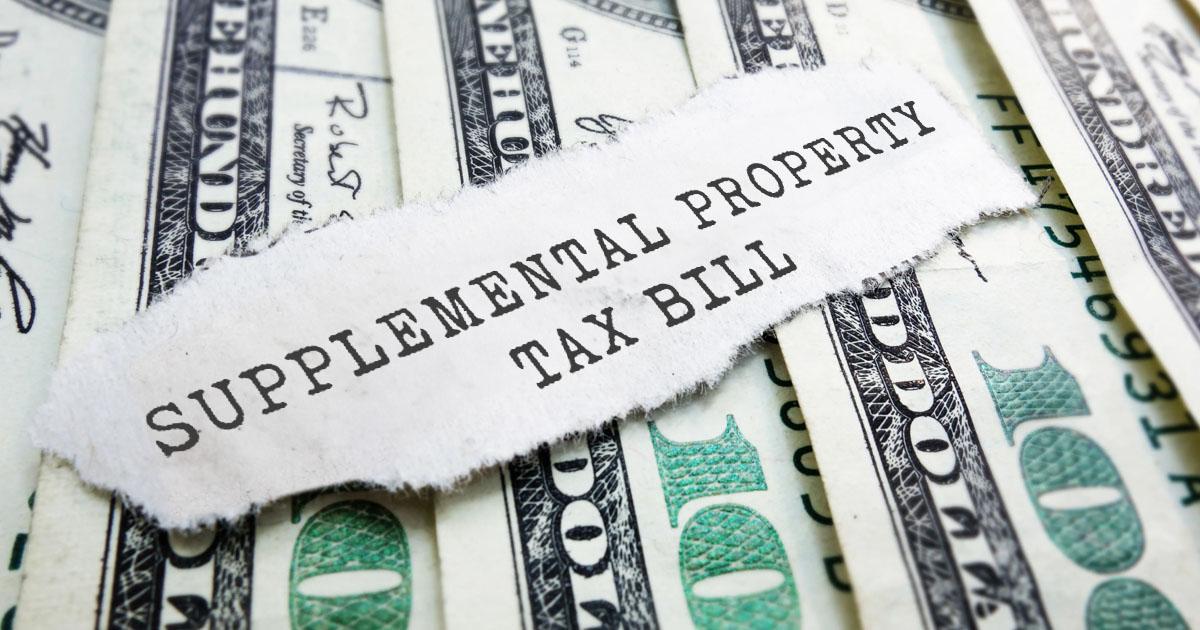What Is A Supplemental Property Tax Bill & Why I’m Getting One

Property taxes are vital for financing local governmental services and infrastructure, ensuring the effective operation of communities. Timely payment of property taxes is essential to support schools, public safety, road maintenance, and other essential public services. However, even diligent property owners who consistently pay their taxes might find themselves facing an unexpected additional tax bill – the supplemental property tax bill. In this article, we will delve into the world of supplemental property taxes, exploring what they are, why they are issued, and what you need to know about them.
What is A Supplemental Property Tax Bill?
A supplemental property tax bill functions as an extra evaluation levied on property proprietors, going beyond the usual yearly property tax invoice. It comes into play when specific circumstances trigger a reevaluation of a property’s assessed value within the fiscal year. These circumstances encompass a range of events such as changes in ownership, the completion of new construction, substantial property improvements, or any adjustments that influence the property’s overall value.
For instance, in 1983, California implemented the Supplemental Real Property Tax Law as part of a broader initiative to bolster its educational sector. The introduction of this law aimed to generate a significant revenue stream, earmarked for schools, by collecting supplemental property taxes. This legislative framework was designed to ensure that property owners contribute their equitable share, as determined by the recalibrated market value of their properties.
Why Did I Get A Supplemental Tax Bill?
Several factors could prompt the issuance of a supplemental property tax bill:
- Change in Ownership – When a property changes hands due to purchase or transfer, the property’s assessed value is recalculated based on the prevailing market value. If this new assessed value surpasses the previous valuation, a supplemental property tax bill may be issued to cover the resulting augmented tax liability.
- New Construction or Improvements – Noteworthy property enhancements or the construction of new structures can lead to an upswing in the assessed value. For example, if you undertake a significant renovation, add an extension, or create a new accessory dwelling unit (ADU), the assessed value of your property could undergo an increase, prompting the issuance of a supplemental tax bill that reflects this enhanced value.
- Decline in Value – In certain instances, a property’s value might diminish, potentially resulting in a reduction of the assessed value. This decline could lead to the issuance of a negative supplemental property tax bill, which would correspond to a lowered valuation.
How Much Would I Need to Pay?
The calculation of a supplemental property tax bill involves a meticulous assessment of the alteration in the property’s assessed value stemming from the event that triggered the reassessment. To compute the tax obligation, you subtract the property’s prior assessed value from the new market value, as determined by the reassessment. The resulting discrepancy is then subjected to the local property tax rate, which is often set at 1%. This rate is applied to the difference to ascertain the precise supplemental tax amount you’re required to pay.
Is It Something that I’ll Get Regularly?
Supplemental property tax bills are not a recurrent occurrence for most property owners. They are primarily prompted by specific events, such as changes in ownership or property enhancements, that significantly impact the property’s assessed value. Following the issuance of a supplemental tax bill prompted by a specific event, you will not typically receive subsequent bills about the same occurrence. It’s essential to note, however, that future events that lead to adjustments in the property’s value could potentially trigger additional supplemental bills in subsequent years.
What Happens if I Don’t Pay My Supplemental Property Tax?
Adhering to the payment of your supplemental property tax bill is imperative to avoid penalties and potential repercussions. Failure to remit payment within the specified timeframe could result in a penalty of 10%. Furthermore, should the bill remain unpaid beyond the June 30th deadline, your property could be classified as being in “tax default.” Subsequently, you might incur a penalty of 1.5% per month (equivalent to an 18% annual penalty rate), in addition to supplementary fees.
Are there Exceptions to the Supplemental Property Tax Bill?
While supplemental property tax bills are commonly associated with specific events that trigger changes in a property’s assessed value, there are certain exceptions and nuances to be aware of. These exceptions can vary based on jurisdiction and local tax laws. Here are a few scenarios where exceptions might apply:
1. Transfers Between Family Members
In some cases, property transfers between close family members, such as parents and children, or spouses, might be excluded from triggering a supplemental tax bill. These transfers may qualify for exemptions or exclusions, which could alleviate the need for a reassessment and subsequent supplemental tax bill. However, specific criteria and documentation might be required to qualify for such exemptions.
2. Intra-Company Transfers
In certain instances, property transfers between affiliated companies or entities within the same corporate structure might not trigger a reassessment and supplemental tax bill. This exception is often aimed at preventing undue financial burdens on businesses engaged in internal reorganization or restructuring.
3. Intergenerational Transfers
Some jurisdictions provide exemptions for intergenerational transfers, allowing parents to transfer property to their children without triggering a reassessment. These exemptions are typically designed to facilitate the passing down of property within families while minimizing the potential impact of increased property taxes.
4. Agricultural or Open Space Land
Properties that are classified as agricultural land or open space land for conservation purposes might qualify for special assessments or reduced property tax rates. This can include lands used for farming, ranching, or other agricultural activities, as well as properties designated for environmental preservation.
5. Disaster Relief
In the aftermath of natural disasters, jurisdictions may offer temporary relief from reassessments and supplemental tax bills for properties affected by the disaster. This can provide much-needed financial relief to property owners dealing with the aftermath of catastrophic events.
It’s important to note that these exceptions can vary significantly depending on the state, county, or municipality you reside in. Local tax authorities and assessors’ offices can provide specific information about potential exemptions and exclusions that may apply to your situation. Consulting with tax professionals or legal experts can also offer valuable insights into the potential exceptions that might affect your property’s supplemental tax assessment.
Bottom Line
While property taxes are a recurring responsibility, supplemental property tax bills are issued under specific circumstances, reflecting changes in property value due to events like ownership changes or property improvements. Understanding the concept of supplemental property taxes, the reasons behind receiving them, and the potential consequences of non-payment can help property owners navigate this aspect of their financial obligations. To avoid surprises and ensure compliance, it’s important to stay informed about your property’s assessed value and any potential triggers for supplemental tax assessments.

